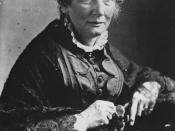There are several events that strengthened the antislavery movement prior to the Civil War. These events include the establishment of an antislavery newspaper, the tension Elijah P. Lovejoy's death caused, the law passed in 1850 denying runaway slaves the right to a trial, Harriet Beecher Stowe's involvement in the movement, The Dread Scott Case, and finally the John Brown movement. Collectively, these events supported and established the antislavery movement prior to the Civil War.
As early as the eighteenth century, people such as the Quakers had been opposed to slavery and began to form manumission societies early in the nineteenth century. In 1817, the American Colonization Society was established. Its main concept was to convince free blacks to move to a settlement in West Africa called Liberia. However, this was unsuccessful due to the fact that most blacks wanted live out their lives where they were born and raised.
William Lloyd Garrison of Boston was another pioneer of the antislavery movement. He helped found the New England Antislavery and American Antislavery Societies. In 1831, he ran an anti slavery newspaper, The Liberator, which helped to spread the antislavery message to the masses.
In 1837, another advocate of an antislavery newspaper, Elijah P. Lovejoy was killed by an angry mob. This was around the time antislavery meetings were broken up and antislavery pamphlets were destroyed. These events struck a nerve with many that felt events like these put their right to freedom of speech and right to assembly in danger. Furthermore, it succeeded in bringing more people into the antislavery movement.
In the 1850's, a law was passed that denied runaway slaves the right to a trial by jury or to even testify on their own behalf. The law further stated that civilians were required to help the United...


